
They used to be called the FAANG stocks, and are now better known by the acronym FANMAG. But the small number of large technology companies that dominate the US stock market — Facebook, Amazon, Netflix, Microsoft, Apple and Google — continue to attract plenty of publicity in the financial media. Nothing though lasts for ever in equity investing. As ISHAN GHOSH from Dimensional Fund Advisors explains, broad diversification makes much more sense than focusing on the latest fad.
Key takeaways
- FANMAG returns have been extreme relative to their contemporaries, but not their predecessors—their performance has been in line with the average top performers throughout US stock market history.
- The FANMAGs were the big winners from a broader group of large tech companies, most of whom have lagged the market.
- Following the popularity of the FAANG stocks, FANMAGs are the current fad. But history suggests fad-based investing is no substitute for broad diversification and a consistent approach.
A handful of large technology stocks have garnered attention for outsize returns in recent years. Collectively referred to by the FANMAG acronym, Facebook, Amazon, Netflix, Microsoft, Apple, and Google (now trading as Alphabet) all substantially outperformed the US market1 in the eight calendar years that they have all been public companies (Facebook went public in May 2012).2 Emerging as winners from among a large number of companies that fared less well during 2013–2020,3 these juggernauts bested most of their surviving peers with annualized outperformance versus the US market ranging from 7.31 (Alphabet) to 42.58 percentage points (Netflix), as shown in Exhibit 1.
EXHIBIT 1
At the Top of Their Game
Annualized compound return in excess of US market, January 2013–November 2020
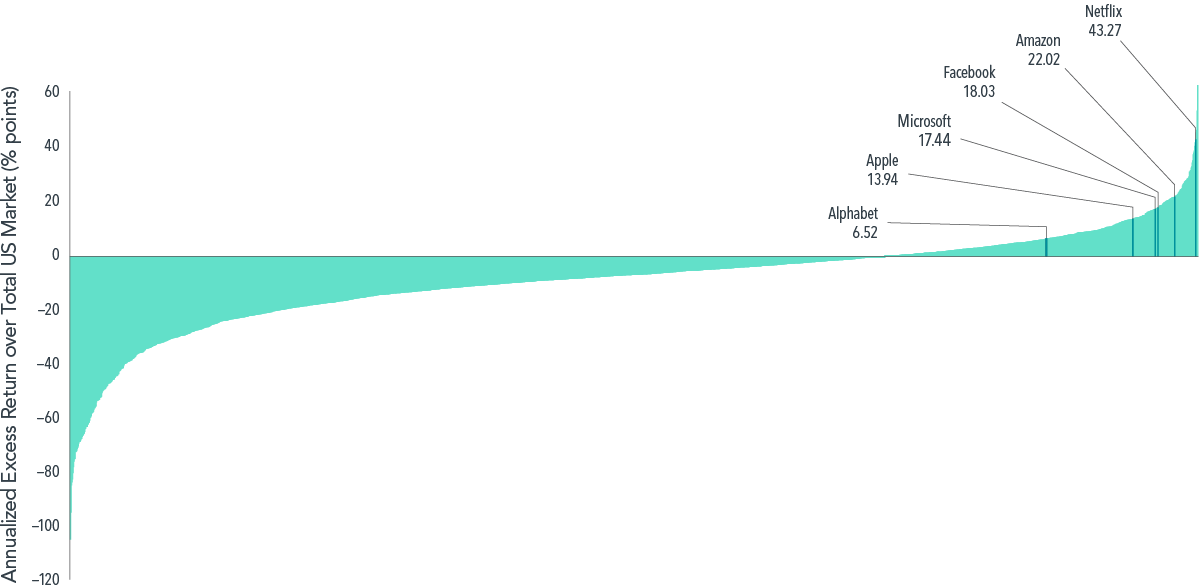
Past performance is no guarantee of future results.
While this performance dazzled investors and dominated headlines during 2013–2020, a more complete picture emerges when accounting for the many companies whose investors were less fortunate over the period. As shown in Exhibit 2, of the 10 largest US technology stocks as of January 2013, all but Apple, Microsoft, Alphabet, and Amazon underperformed the US market over the same period that elevated their tech peers to financial market stardom.
EXHIBIT 2
Same Game, Different Outcome
Performance of the 10 largest US technology stocks as of January 2013 from January 2013 to November 2020
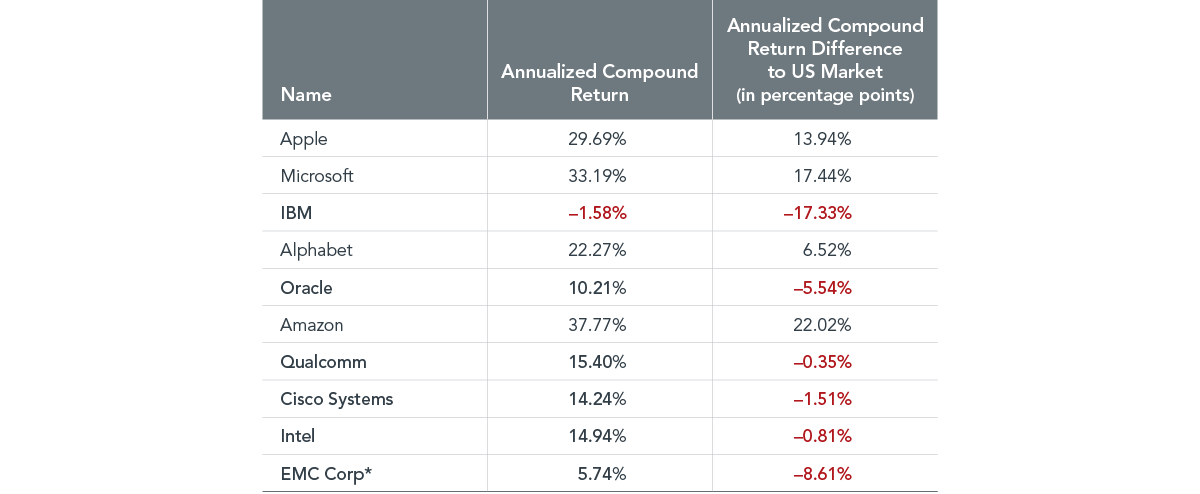
Past performance is no guarantee of future results.
Exhibit 3 shows the hypothetical growth of wealth for an investor who put $1 in each of the 10 largest technology stocks and the US market in January 2013. While the $1 invested in Amazon and Apple, for example, would have grown to $12.63 and $7.18, respectively, by November 2020, the returns of their non-FANMAG tech contemporaries would have failed to even surpass the US market.
EXHIBIT 3
Growth of Wealth
Growth of wealth for 10 largest US technology stocks as of January 2013 and US market, January 2013–November 2020
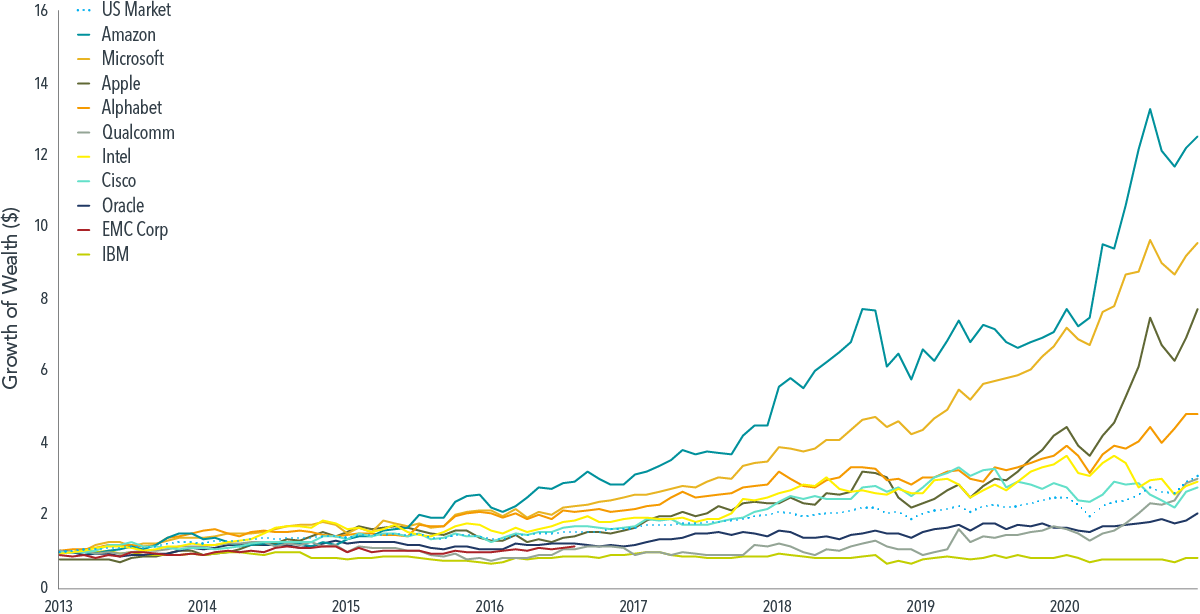
Past performance, including hypothetical performance, is no guarantee of future results.
FANMAG returns certainly stand out among those of their contemporaries, but the range of individual stock outcomes has often been immense. A historical look shows that FANMAG performance has been quite ordinary in the context of past top-of-the-market performers. Drawing on stock return data since 1927, Exhibit 4 indicates that historical top performers often experienced larger outperformance relative to the US market than the FANMAG stocks realized during 2013–2020. For example, Apple’s 2013–2020 annualized excess return of 13.00 percentage points places it at the 93.67 return percentile among all US stocks that were trading in January 2013 and survived the eight-year period that followed. However, the average outperformance of stocks at the 93.67 percentile over eight-year rolling periods from 1927 to 2020 was 15.60 percentage points, or about 2.60 percentage points higher. With the exception of Netflix, the same holds for the other FANMAG stocks, with historical outperformers at the same return percentile outperforming the market by more than the FANMAG stocks did in 2013–2020.
EXHIBIT 4
A Familiar Tale for the Right Tail
FANMAG outperformance vs. US market, 2013–2020, compared to average historical outperformance of stocks at same return distribution percentile over rolling eight-year periods, 1927–2020
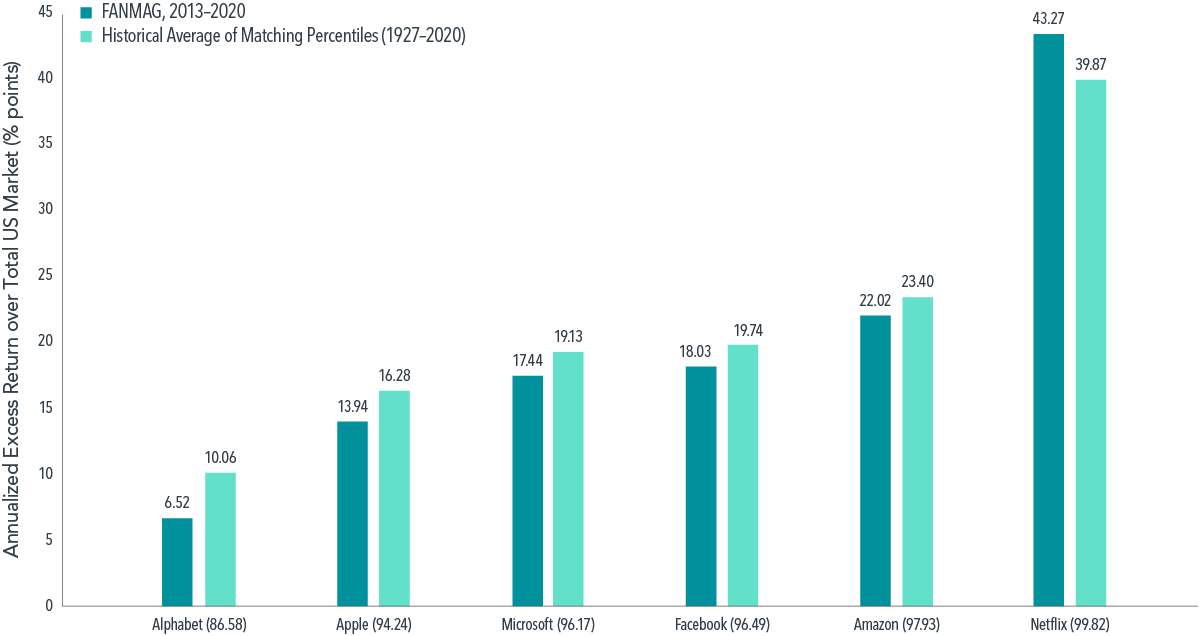
Past performance is no guarantee of future results.
A defining trait of the FANMAG performance is that these outsize returns have come from among the largest companies in the US, implying they were meaningful contributors to the overall US market’s return. However, historical data show that this too is nothing new.Defining a stock’s return contribution as its total return weighted by its beginning-of-period market capitalisation weight, we see that Apple’s contribution to the US market for the period 2013–2020 was 19.68%. How does this figure compare to other top return contributors? Exhibit 5 illustrates the top return contribution and the annualized US market return over rolling eight-year periods since 1927, revealing instances of return contributions by the likes of AT&T, General Motors, and General Electric that were comparable to, or even exceeded, that of Apple in 2013–2020.
EXHIBIT 5
Key Contributors
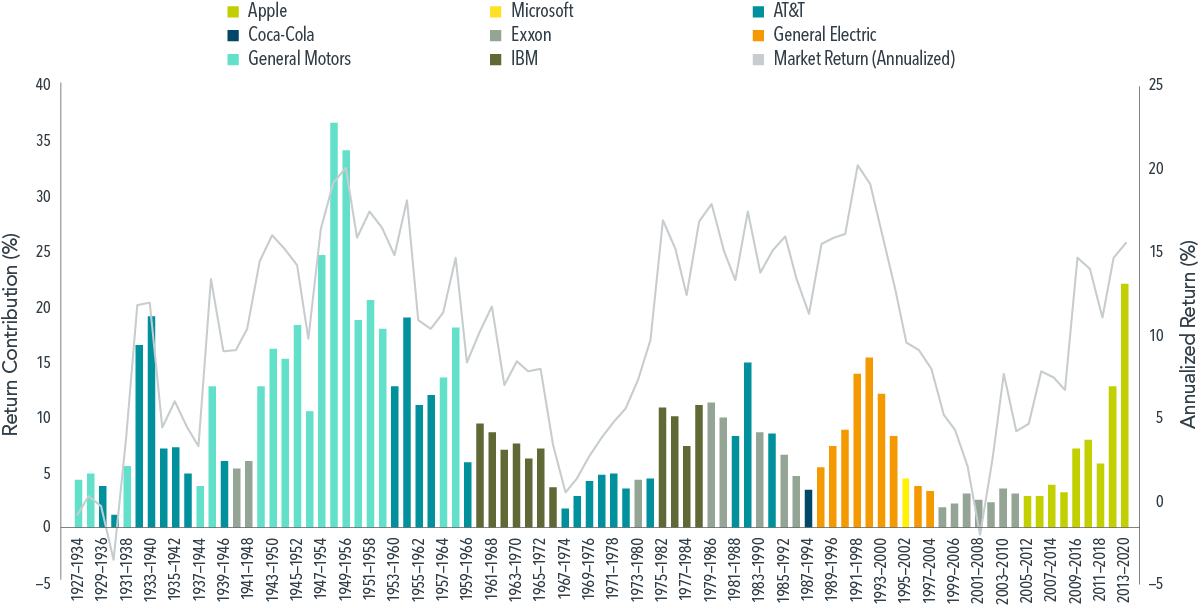
Past performance is no guarantee of future results.
FOTW (Flavour of the Week)
If history is any guide, the FANMAG acronym will eventually be replaced by another trendy name. For example, stock market historians will remember the Nifty Fifty in the 1960s and 70s, a set of 50 blue-chip stocks like Coca-Cola and General Electric. The early 2000s witnessed increasing adoption of the acronym BRIC, representing investment opportunities in the fast-growing emerging economies of Brazil, Russia, India, and China. More recently, the WATCH companies — Walmart, Amazon, Target, Costco, and Home Depot — have also gained traction in the market’s lexicon.
While documenting trends in finance is entertaining, there is little evidence that investors can spot these trends in advance in a way that would enable market-beating performance. Moreover, concentrated bets on high-flying stocks can expose investors to idiosyncratic risks and a wider range of possible outcomes. By contrast, a sound investment approach based on financial science emphasises the importance of broadly diversified portfolios that provide exposure to a vast array of companies and sectors to help manage risks, increase flexibility in implementation, and increase the reliability of outcomes.
FOOTNOTES
1US market is defined as Fama/French Total US Market Research Index.
2Facebook, Amazon, Apple, Netflix, and Google are often referred to as the FAANG stocks.
3Calendar year 2020 data is updated only through November 2020.
DISCLOSURES
The information in this document is provided in good faith without any warranty and is intended for the recipient’s background information only. It does not constitute investment advice, recommendation, or an offer of any services or products for sale and is not intended to provide a sufficient basis on which to make an investment decision. It is the responsibility of any persons wishing to make a purchase to inform themselves of and observe all applicable laws and regulations. Unauthorised copying, reproducing, duplicating, or transmitting of this document are strictly prohibited. Dimensional accepts no responsibility for loss arising from the use of the information contained herein.
This article first appeared on the Dimensional website.
Interested in more insights from Dimensional? Here are some other articles from this series:
Should a top-heavy stock market worry us?
Why the disconnect between the economy and markets?
The widening valuation spread between growth and value
What will the recession mean for small-cap stocks?
PREVIOUSLY ON TEBI
Does investor sentiment predict market movements?
Attackers attack, defenders defend
Should Bitcoin be in your portfolio?
Can ANY adviser add consistent alpha
What does GameStop mean for market efficiency?
OUR SISTER BLOGS
If you’re a financial adviser or planner and you enjoy TEBI’s articles, why not try our sister blogs, Adviser 2.0 and Evidence-Based Advisers?









